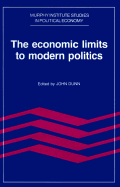Book contents
- Frontmatter
- Contents
- Preface
- List of contributors
- The economic limits to modern politics
- Introduction
- 1 The economic limits to modern politics
- 2 Free trade and the economic limits to national politics: neo-Machiavellian political economy reconsidered
- 3 The political limits to premodern economics
- 4 On some economic limits in politics
- 5 International liberalism reconsidered
- 6 Capitalism, socialism and democracy: compatibilities and contradictions
- Index
6 - Capitalism, socialism and democracy: compatibilities and contradictions
Published online by Cambridge University Press: 01 June 2011
- Frontmatter
- Contents
- Preface
- List of contributors
- The economic limits to modern politics
- Introduction
- 1 The economic limits to modern politics
- 2 Free trade and the economic limits to national politics: neo-Machiavellian political economy reconsidered
- 3 The political limits to premodern economics
- 4 On some economic limits in politics
- 5 International liberalism reconsidered
- 6 Capitalism, socialism and democracy: compatibilities and contradictions
- Index
Summary
Any coherent modern political theory must contain, at a minimum, three elements. It must contain in the first place an articulated conception of individual good. It must add to this, in the second place, a constitutional theory of how power can be institutionalized, not merely to acknowledge formally the status of this conception of individual good, but also to promote its effective implementation in practice. And it must round these two elements out with a third and equally indispensable element: a conception of sound economic policy that can reasonably hope to prove effective through time. Each of the elements in this inventory could do with some glossing, and no one should mistake it as, even in intention, an exhaustive list. But it does, I trust, focus helpfully the three most problematic and least dispensable elements in modern political theory and brings out immediately the still more problematic relations that obtain between them. One feature which is rather evidently missing from the three elements is a determinate (and essentially prepolitical) conception of a community of membership which furnishes many of the most significant components in the several conceptions of individual good held by its members, lends a natural and compelling form to the constitutional theory of how power can best be institutionalized to do justice to these conceptions, and fosters (or at least fails to militate drastically against) the devising and sustaining of dependable modes of economic policy.
- Type
- Chapter
- Information
- The Economic Limits to Modern Politics , pp. 195 - 220Publisher: Cambridge University PressPrint publication year: 1990



